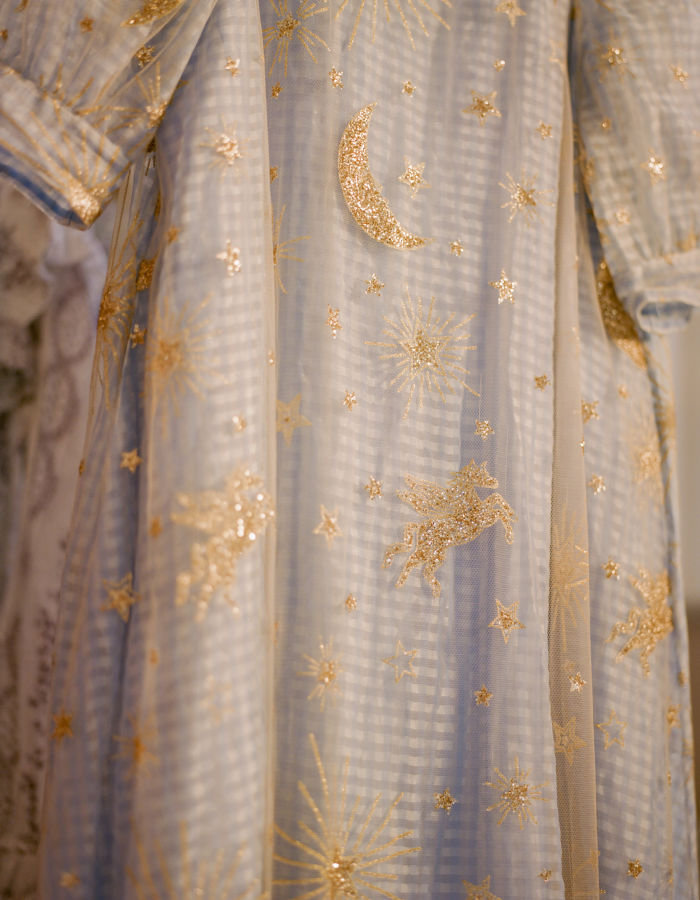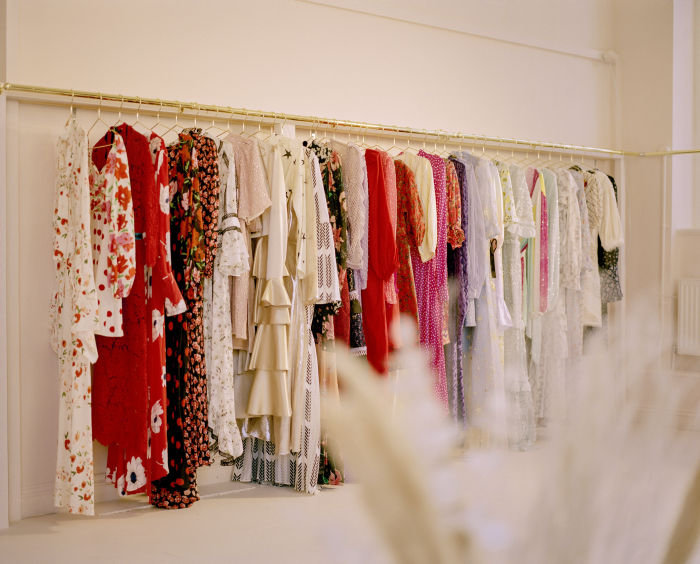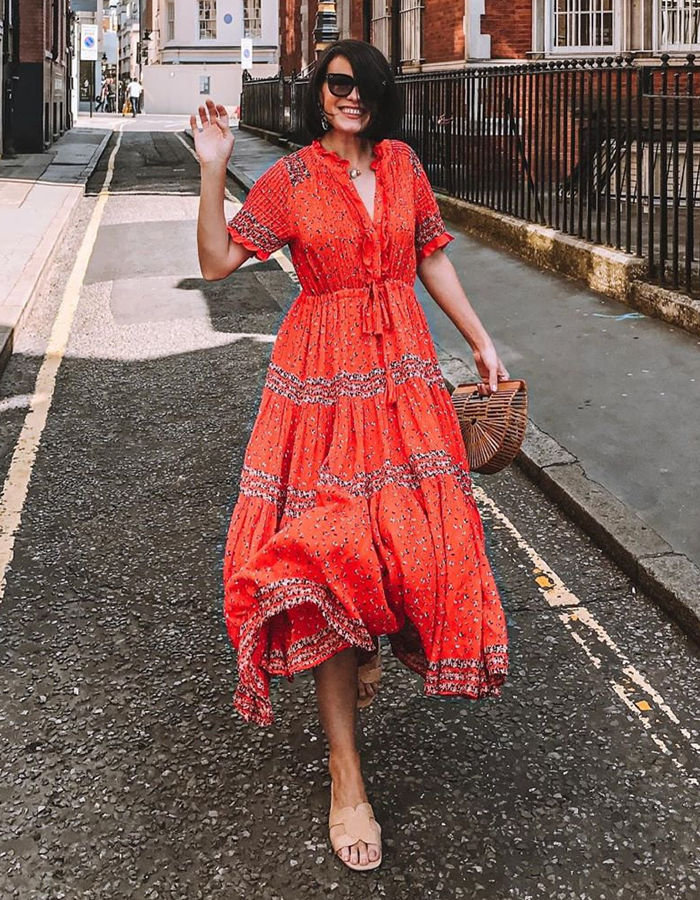Why renting your wardrobe makes fashion sense
Simply sign up to the Fashion myFT Digest -- delivered directly to your inbox.

“You want Chanel? There’s a woman on our site who has everything. Any bag you want, you name it — she has it.” Victoria Prew, 26, is telling me about her company Hurr Collective, the UK’s first peer-to-peer rental website for women’s fashion, which she co-founded and co-coded from scratch.
Seated on a sofa in an ankle-length floral dress (rented, of course) and suede boots, Prew looks incredibly relaxed despite managing a rapidly growing business. She only launched Hurr in February but is already in the middle of her first investment round, hiring more employees, and last week she opened the UK’s first peer-to-peer rental pop-up shop here in London.
“It’s similar to Airbnb but with clothing,” says Prew of the concept behind Hurr. Unlike most fashion rental companies, individual users can sign up and rent their clothes to others on the platform. Not only does it enable people to rent clothes without a long-term commitment, those loaning their clothes can profit (in some cases greatly) from their wardrobes.
On the site at the moment is a floral Kitri dress, perfect for weddings, which can be rented for £61; an Isabel Marant embellished jacket going for £52; and a Saint Laurent check cape, which usually retails for £1,530, available for £297. Prew herself owns a Ganni dress that she bought from luxury second-hand fashion website Vestiare Collective for £150, and now rents out for £80 a week. “I don’t like calling it a side hustle,” says Prew, “but if you are savvy and buy an expensive item and rent for the right price, you can make a real profit.”

To give the process a more curated, glossy twist, there are also features on the website giving advice on what to wear for brunch, date nights, weekends away and summer holidays. “There is a lot going on,’’ Prew admits, “but the appetite for rented fashion is massive, especially among young women — a typical Hurr girl is aged between 25 and 35 — and it’s only gaining momentum”.
The sharing economy for rented fashion has been growing for some time. US website Rent the Runway launched in 2009 and was one of the first sites that allowed fashion consumers to borrow high-end luxury clothing: in March this year it was valued at $1bn. In Australia and Asia, too, the industry is booming. Rental website YCloset, founded in Beijing in 2015, received $50m in a series C fundraising round led by Alibaba Innovation Ventures, SoftBank China and Sequoia China in 2017. China’s market for womenswear rentals is predicted to be worth more than Rmb100bn in the coming years.


According to a study by London shopping centre Westfield, 59 per cent of Londoners who consider themselves “fashion forward” said they would spend £200 or more on a monthly unlimited subscription to a rental website. This appetite seems to be reflected in the take-up for Hurr; between March and September, 10,000 new users signed up to the platform, which has seen month-on-month growth of 120 per cent in listings.
Prew attributes some of the enthusiasm for renting clothes to sustainability. “A year ago, people were like, ‘oh, sustainability’s a nice trend’. But we were like, it’s not a trend, it’s a movement. Everyone knows how polluting the fashion industry is; 11m items of clothing end up in landfill each week in the UK alone,” says Prew. “So renting clothing is a great way to reduce your footprint and make your clothing lifecycle entirely circular. Fewer young people want to buy fast fashion that will end up in landfill. They want to have fashion that makes them feel good and also lasts. So why not rent items you can wear for any day or event, not just occasion wear? The fact is, this is the future of fashion.”
Hurr is not just a place for high-end fashion labels such as Gucci, Chanel and Burberry. Prew likes the fact there are more mid-range brands such as Ganni, Reformation and Kitri on the site. But in order to prevent users renting out fast-fashion items there is a valuation process — clothes must have a price point of £150 or higher. Currently the most popular brands rented and loaned are Zimmermann, Reformation and Retrofete.

“American designers do particularly well,” explains Prew. “When you buy US labels you pay shipping costs; of course with us there is none of that. I particularly love the fact Reformation is up there, as they are a sustainable brand. It is great to see sustainable clothing being used in a circular way.”
In keeping with her sustainable ethos, Prew has tried to make sure every aspect of the business is as green as possible. Delivering clothes often entails a lot of excess plastic, as well as exhaust emissions, so items of clothing can be exchanged through Geo-tag meetups (an application on the website that allows you to see where other members of Hurr are geographically) or via Royal Mail or the cycling courier service Pedals.
Sustainable packaging company RePack provides bags that can fit through a letterbox, can be used about 20 times, and when worn out can be sent to the RePack HQ, repurposed and sent back out again. “They’re completely circular, it’s really cool,” says Prew. “We’ve just pushed that out to our users.” For those renting out their clothes, Hurr also work with Blanc, an eco-friendly dry cleaning service that does not use harmful chemicals.
The Next Generation
Forget the millennials — a new generation of disruptors is on the move. Read about them all this week in Life & Arts
Part one
Reshaping Africa’s future
Part two
NextGen in charts
Part three
The new sound of pop
Part four
Lunch with the FT
Part five
How video shaped a generation
Explore the series here.
Competition from other peer-to-peer rental companies is already emerging in the UK, such as websites On Loan and Girl Meets Dress. By Rotation, the brainchild of former credit investment analyst Eshita Kabra-Davies, is the UK’s first fashion rental app for all genders which launched in October this year. (Hurr is a website, not an app). Within weeks of By Rotation launching, they had 2,000 sign-ups, with transactions happening nationwide. This does not worry Prew, as there is another element to Hurr, one that she is particularly excited and proud of — a blossoming community. “Our messaging system has just completely boomed, and percentage-wise most users message each other before they actually put through transactions, which is quite interesting,” says Prew.
“For us, it’s fascinating because it’s a bit like Airbnb; you would probably message the host before you booked it, asking any questions; it’s exactly the same thing. Users are nurturing their relationships. We’ve also seen people really seeking out fashion advice,” Prew continues, “users asking, ‘do you think a nude heel would look better with that? Do you think it could look cool in the daytime with trainers?’ People constantly send images to each other of how they have worn the dress, or send images to give others inspiration. We’ve also seen more and more Hurr girls meeting up to swap clothing and then in turn becoming friends. It’s very real life, and I guess, for me, this is what I always hoped it would be, that people would actually connect through the platform with each other.”


The high level of engagement on-site is part of the reason Prew decided to create the pop-up shop, the first of its kind in the UK. Now open for a month in London’s Belgravia, it will feature a range of curated items from some of Hurr’s top lenders. People can then rent items directly from the pop-up, sign up to Hurr’s website, meet fellow Hurr users in the in-house café or take part in the range of networking activities Hurr is hosting.

Join us at the FT NextGen festival in London on November 16 for a day of talks and events that ask the big questions of today — and tomorrow
There are upcycling and embroidery workshops, meditation sessions, and a roundtable discussion with the “Junior Network” (an event for young fashion professionals to discuss each other’s thoughts, ideas and experiences within the industry).
With such rapid growth, what does the future hold? “We have had a demand from menswear,” says Prew, “particularly for those hype collaboration pieces. So we will add that. But also maternity wear is really interesting, and childrenswear . . . Our idea is to focus, for now, on one thing and really nail it, and then, once we’ve got all of the data, and we’ve built the best product, we can scale it up to include, well, everything.”
Want to hear Flora Macdonald Johnston speak more on fashion and sustainability? Come join us at the FT NextGen festival on November 16. Tickets available here
Follow @financialtimesfashion on Instagram to find out about our latest stories first. Listen and subscribe to Culture Call, a transatlantic conversation from the FT, at ft.com/culture-call or on Apple Podcasts

Comments